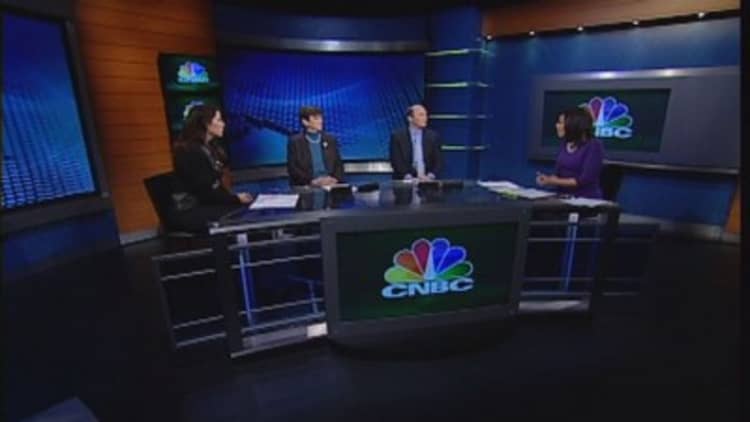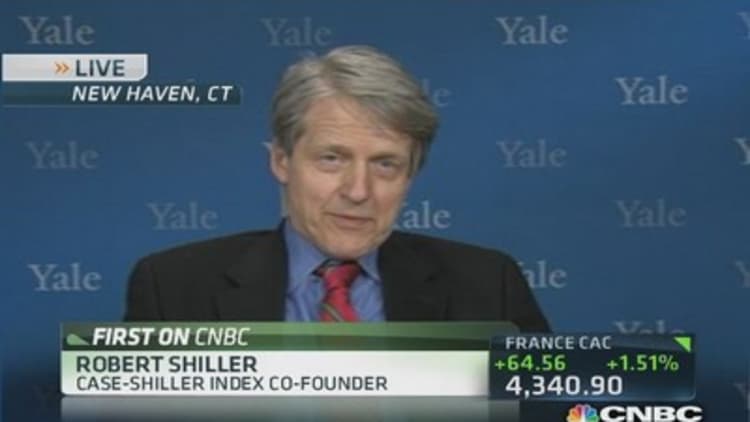
Many of America's baby boomers are gearing up for retirement, banking on Social Security, 401(k) plans and their home equity to keep them afloat through their golden years.
Today, boomers between the ages of 50 and 68 account for more than 25 percent of the country's population. Every day for the next 19 years, close to 10,000 Americans will reach the retirement age of 65, according to Pew Research.
The retirement shortfall this generation faces is a serious one: A little more than 60 percent of early and late boomers say they are not saving enough for retirement, according to Financial Finesse's 2013 Generational Research study, which examined 20,575 employee assessments taken on the financial education company's website. Baby boomers face problems their parents did not, such as big tuition bills for their kids' college educations and a lack of savings for long-term health care.
As markets continue to hit all-time highs and both employees and employers boost retirement-plan contributions, boomer's portfolios are rising. According to the financial-service firm Fidelty Investments, by the end of 2013, the average 401(k) balance hit an all-time high of more than $89,000—up 15.5 percent year over year.
Those 55 and older who are getting ready for retirement saw their average balance rise to $165,200. Fidelity found that those individuals holding both a 401(k) and a personal individual retirement account (IRA) with the firm saw balances jump, on average, to $261,400.
Read MoreHow to avoid outliving your nest egg
Despite this healthy growth in portfolio size, many boomers are unlikely to have enough dollars to last them throughout retirement—even with Social Security. The Employee Benefit Research Institute found that a little more than 40 percent of boomers are worried about running out of money in retirement, despite the fact that those savings numbers have slightly improved.
One of the best options for covering retirement expenses is real estate, and a large majority of baby boomers are homeowners. Financial Finesse's report found that nearly 87 percent of early boomers own a home; for late boomers it's 84 percent. A boomer's home can be the key to financial stability in his or her golden years.
The state of real estate
The housing market appears to be on a steady recovery track since its crash in late 2006, and "homes prices are 5 percent off of the historical normal," according to Sean Aggarwal, chief financial officer of residential real estate website Trulia.
In 2013 the housing market was up big—11.3 percent—according to the Case-Shiller Home Price Indices, making it the best year since 2005. Las Vegas, Los Angeles and San Francisco had the largest boosts last year, up more than 20 percent. Though this year, projections are not expect to shoot through the roof like last year. The research firm Clear Capital, which serves the mortgage and lending industry, projects that in 2014 home prices will rise between 3 and 5 percent.
Read MoreHow to grow your 401(k) at any age
This spring's selling season looks to be an attractive one, according to Wells Fargo chief financial officer Tim Sloan, who recently said on CNBC's "Squawk Box" that home affordability continues to be "very attractive."
Given last years stellar rise and this years projected growth, which is more in line with historical norms, near-retirees might be considering exiting the market in the near future in case home prices reverse course. It's the age old dilemma of getting out now or staying in the game, as homes come with a level of risk, just like any other asset.
One reason home sales might not continue to climb as they did last year is rising interest rates—the main driver for this being the Fed's likely move to continue tapering.
Read MoreReverse mortgages: Easy money or dumb move?
Despite prices still being up year–over–year, this week's Standard & Poor's/Case-Shiller 20-city home price index showed a dip in January—the third month in a row. This was mainly due to a perfect storm of a brutal winter, low inventory and rising interest rates. Despite the fact that the index dropped just .01 percent for the last 3 months, Yale economics professor and co–founder of the index Robert Shiller did say on this week's "Squawk on the Street" that the market is "gradually slowing...according to the data we have".
Also, this week's U.S. Department of Commerce report showed that new home sales in February were down both 3.3 percent from January and 1.1 percent from a year ago .

Downsizing and reverse mortgages
Baby boomers are carrying a heavy load: A Securian Financial Group report found that nearly 68 percent of pre-retiree boomers are expecting to carry mortgage debt into retirement. Given the present market and retirement-savings shortfall, many Americans on the verge of exiting the workforce could be contemplating moving on from their current dwellings.
Downsizing and moving often means lower home-maintenance costs, utilities and property taxes (if relocating to a more taxpayer-friendly state). By doing so, those on the verge of retirement will be able to cash out with a profit to either add to their nest egg or pay down some of that outstanding mortgage debt.
"Many boomers are less inclined to want to maintain a large home ... preferring instead to shift some of their home equity into income-producing investments while simplifying their lives," said certified financial planner Seth Streeter, president of financial advisor firm Mission Wealth.
Real estate tends to keep up with inflation, but a baby boomer will often need liquidity, and the only asset available to create that is their home.Elizabeth Dipp Metzgerpresident, Crown Wealth Strategies
With a steady rise in the market, some financial planners are not seeing the signals of further steep rises or declines. Financial advisor Elizabeth Dipp Metzger, president of Crown Wealth Strategies, said that "real estate tends to keep up with inflation, but a baby boomer will often need liquidity, and the only asset available to create that is their home."
A reverse mortgage is another option for Americans age 62 or older who are looking to add dollars to their retirement savings.
"Reverse mortgages are rising, but there is something of a social stigma attached to them...often viewed as a desperate move," said Anthony Webb, a senior research economist at the Center for Retirement Research at Boston College.
Read MoreSave for independence, not retirement
However, reverse mortgages can close a retirement shortfall, and at the age of 62, an individual can lock in the amount they will receive. Whether locking it in for a lump sum, lifetime monthly income or line of credit, the amount you get "is based on the current value of your home and interest rates," said Webb.
However, reverse mortgages are not without their problems; the products have been routinely scrutinized by the government and tighter regulations have made it harder for seniors to qualify, according financial experts. Aside from qualifying issues, these products tend to come with extra fees. Due to rising property taxes and premiums on required insurance, many people who have taken out such loans have defaulted on their homes. According to AARP, 1 in 10 reverse mortgages is in default.




